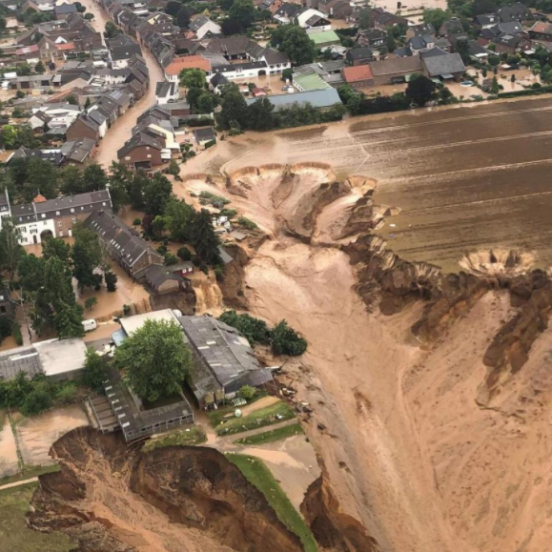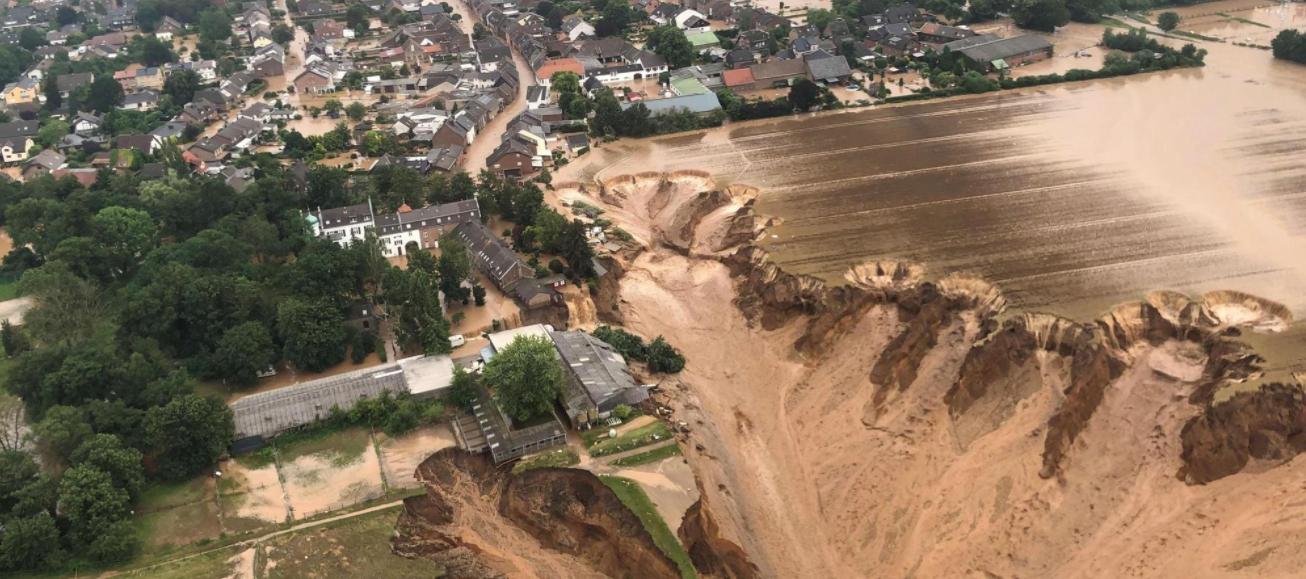Climate, Health and Equity Brief
‘Permanent Emergency’ and a race against time
July 16, 2021

The Climate, Health & Equity Brief is GMMB’s take on the week’s news on the current impacts of climate change. If you haven’t subscribed yet, you can do so by clicking here.
Hot Topic: Preventing disaster. With violent storms and sewage-contaminated floods killing hundreds and devastating towns in Germany and Belgium, continued recording-breaking heat in normally temperate areas, and a 1,000-year megadrought in the American Southwest, this week has looked apocalyptic.
Unfortunately, a new study shows in stark terms how these events are becoming the new norm: a tropical storm’s likeliness to become a major hurricane has increased eight percent every decade. Wildfires in the West are now ravaging double the normal area impacted by fires in any given year. The recent heat dome that scorched the Pacific Northwest made temperatures soar as much as 11 degrees above record all-time highs. And crumbling glaciers are producing quasi-earthquakes as they collapse into the sea.
With all signs pointing to an increasingly severe, ‘permanent climate emergency,’ action is more necessary than ever as we enter a race against time. Today, we are choosing to be optimistic about the moves around the world this week that give us a sliver of hope:
- A French court took the extraordinary step of ruling that the French government must take “all necessary additional steps” to meet Paris Agreement targets, or face sanctions;
- The U.K. announced that it would end its use of coal for electricity by October 2024, a year earlier than previously planned;
- The European Commission proposed a package of aggressive new laws that would reduce emissions 55 percent by 2030 and reach net-zero emissions by 2050;
- 140 mayors across the United States jointly called on Congress to includes aggressive climate measures in the U.S. infrastructure package; and
- More than 30 newsrooms have committed to using to using the phrase “climate emergency” when covering details of the climate crisis.
As the world prepares for the COP26 climate summit in Glasgow this November, we hold out hope that government leaders will continue progress and double down on their commitments toward reaching carbon neutrality and preventing climate apocalypse.
— Matt & Traci, GMMB
Human Health
Unprecedented rainfall and violent storms ravaged parts of Western Europe this week, causing rivers and sewage systems to overflow, devastating parts of Germany and leaving at least 120 people dead and more than 1,300 missing. (The New York Times)
A new report revealed that from 2000 to 2019, extreme temperatures and weather exacerbated by the climate crisis accounted for nearly ten percent of deaths worldwide. (Bloomberg)
Recent reports from the CDC and other health agencies underscore the toll that climate change has on mental health, estimating that over 50 percent of adults and nearly 50 percent of children in the U.S. suffer from depression after extreme weather events. (ABC News)
As exceptionally dry conditions in the U.S. Southwest threaten a “megadrought” not seen in the region in 1,200 years, officials warn that water shortages are all but certain to be announced in the coming months and will continue to worsen as climate change intensifies. (ABC News, The Washington Post)
Recent heat waves, natural disasters, wildfires and other extreme weather events are all signs of the climate ‘permanent emergency’ and its accelerating severity. (The Intelligencer and The Washington Post)
Planetary Health
Scientists estimate that last month’s record-breaking heat wave killed one billion marine intertidal animals on the shores of the Salish Sea, impacting food security and the health of the marine ecosystem in British Columbia’s coastal communities. (National Observer)
Marine biologists are working hard to revive kelp forests along Northern California’s coastline—of which only five percent remain—in an attempt to revive the ocean’s most important carbon capture system. (The Washington Post)
The Paris agreement is humanity’s life insurance…science tells us that it’s not too late yet, but we must hurry.”
-Ursula von der Leyen, President of the European Commission
Equity
A new study found that low-income communities and communities of color in the U.S. face temperature disparities of up to 7°F due to living in urban areas with high concentrations of heat-absorbing concrete and little vegetation to provide any shade. (Axios)
A new analysis revealed that Latinos are twice as likely to live in areas most vulnerable to wildfires in the American West due to affordable housing being concentrated in lower-cost neighborhoods found in remote areas. (Politico)
Politics & Economy
A French court ruled that their government is not on track to meet Paris Agreement deadlines, and that it must take “all necessary additional steps” to meet the targets or face sanctions, marking the first time the country has been mandated to address the climate crisis. (The Guardian)
The city of Miami has introduced a first-in-the-nation Chief Heat Officer whose responsibility includes educating people on heat risks, increasing residential energy efficiency and planting more trees in low-income communities and communities of color to combat disproportionate heat-island effects. (Time)
According to a new U.S. Energy Information Agency report, the cost of cutting 40 percent of oil and gas emissions could be zero if companies simply plug natural gas leaks and collect the natural gas for profit, offsetting costs for emissions reducing projects. (CBS News)
Action
More than 140 mayors across the U.S. are calling on Congress to pursue aggressive climate measures in the infrastructure package. (Politico)
The European Commission unveiled an ambitious plan to tackle climate change this week that commits to moving away from fossil fuels within nine years and taxing polluting imports, among other efforts to achieve net-zero emissions by 2050. (Politico)
The U.K. plans to cease all coal-fired electricity generation by October 2024, a year ahead of previous commitments. (Forbes)
More than 30 global newsrooms have signed onto a statement to commit to using the phrase “climate emergency” when covering details of the climate crisis. (Yes! Magazine)
The state of Maine has become the first in the U.S. to require companies to pay for the costs of recycling their packaging, shifting the burden from taxpayers to companies producing the packaging waste. (The Washington Post)
Kicker
Need more reasons for hope? Check out these podcasts highlighting global climate action and the latest innovations for tackling the climate crisis.
The GMMB Climate, Health & Equity Brief would not be possible without the contributions of the larger GMMB California team—Aaron Benavides, Elke Cortes, Stefana Simonetto and Sydney Lykins. Feedback on the Brief is welcome and encouraged and should be sent to CHandEBrief@gmmb.com.






